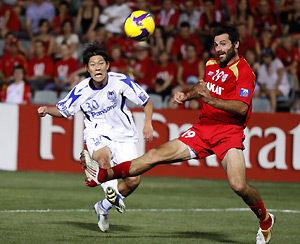Expert

Adelaide United's Sasa Ognenovski beats Masato Yamazaki of Gamba Osaka to the ball during the Asian Champions League final match in Adelaide, Wednesday, Nov. 12, 2008. AAP Image/Rob Hutchison
Pohang’s 6-0 thrashing of Newcastle Jets last week may have ended Australian interest in the Asian Champions League, but the competition itself rumbles on towards the final.
All the talk this week has surrounded Luiz Felipe Scolari’s sensational decision to sign on as coach at Uzbek club Bunyodkor, but it hasn’t gone unnoticed elsewhere that two Korean sides have reached the quarter-finals.
Scolari’s return to management might have shocked the football establishment – what with Bunyodkor hardly being a household name (and a dubiously funded one at that) – but it’s not the first time that “Big Phil” has pitched up on exotic shores.
As a player he had a stint at Saudi side Al-Shabab, while early on in his coaching career he enjoyed a successful spell at Kuwaiti side Al Qadsia.
Money that oil-rich clubs like Bunyodkor can splash about might ultimately redress the balance of power in Asian football, but AFC officials will be pleasantly surprised to see two Korean clubs in the final eight.
FC Seoul did things the hard way, beating J. League champions Kashima Antlers on penalties to book a quarter-final showdown with surprise package Umm Salal of Qatar.
The Korean club received the rub of the green from Australian referee Ben Williams – who sent off Kashima playmaker Mitsuo Ogasawara just after the hour mark – but full credit to the capital outfit for triumphing in a nervy shoot-out.
I spent some time at the upwardly mobile FC Seoul earlier this year, but Pohang’s progression to the final eight comes as somewhat of a surprise.
The North Gyeongsang-based side are not regarded as one of the stronger teams in Korean football, although they did lift a shock K-League title in 2007.
Nevertheless the Steelers have traded in their usually mediocre league form for a decent run on the continent, and their reward is a match-up with none other than Big Phil’s Bunyodkor.
Scolari’s appointment is bound to make headlines in the European press, but it will take much more for those in Europe to take the Asian Champions League seriously.
Last April, ESPN Soccernet columnist Jon Carter penned a piece entitled “ACL facing uphill struggle against Europe” that I couldn’t quite get my head around.
In fairness to Carter, he made some decent points.
But it doesn’t take a genius to figure out that a competition has flaws when it ensures that participants lose money, or where refereeing standards fluctuate so wildly.
However, what irritated me most about Carter’s inferrence was that because the Asian Champions League wasn’t as prominent as its European equivalent, it was hardly worth playing.
I may get roasted for saying it, but it’s a typically English sentiment that I’ve encountered elsewhere.
When Manchester United put five past Gamba Osaka in the FIFA Club World Cup last December, some members of the English press snickered that it was proof that Asian football simply wasn’t up to scratch.
But who expected Gamba to beat Manchester United? And why weren’t the English press talking about Gamba being the first team to score three goals against United in months?
If Gamba are the epitome of a poor football side, I’d hate think what these guys made of West Brom.
At any rate, the Osakans were knocked out by the team I tipped months ago as one of the favourites to lift the Asian crown.
Kawasaki Frontale will go into their quarter-final clash with Nagoya Grampus as favourites, and the AFC are no doubt hoping that the Kanagawa side reach a final played practically on their doorstep.
Holding a one-off final is a mistake, but a National Stadium in Tokyo swarming with Kawasaki Frontale fans might convince those in Europe that the Asian Champions League is a worthwhile tournament after all.
They should consider it so to begin with.
It might not be world class, but at least it’s ours.